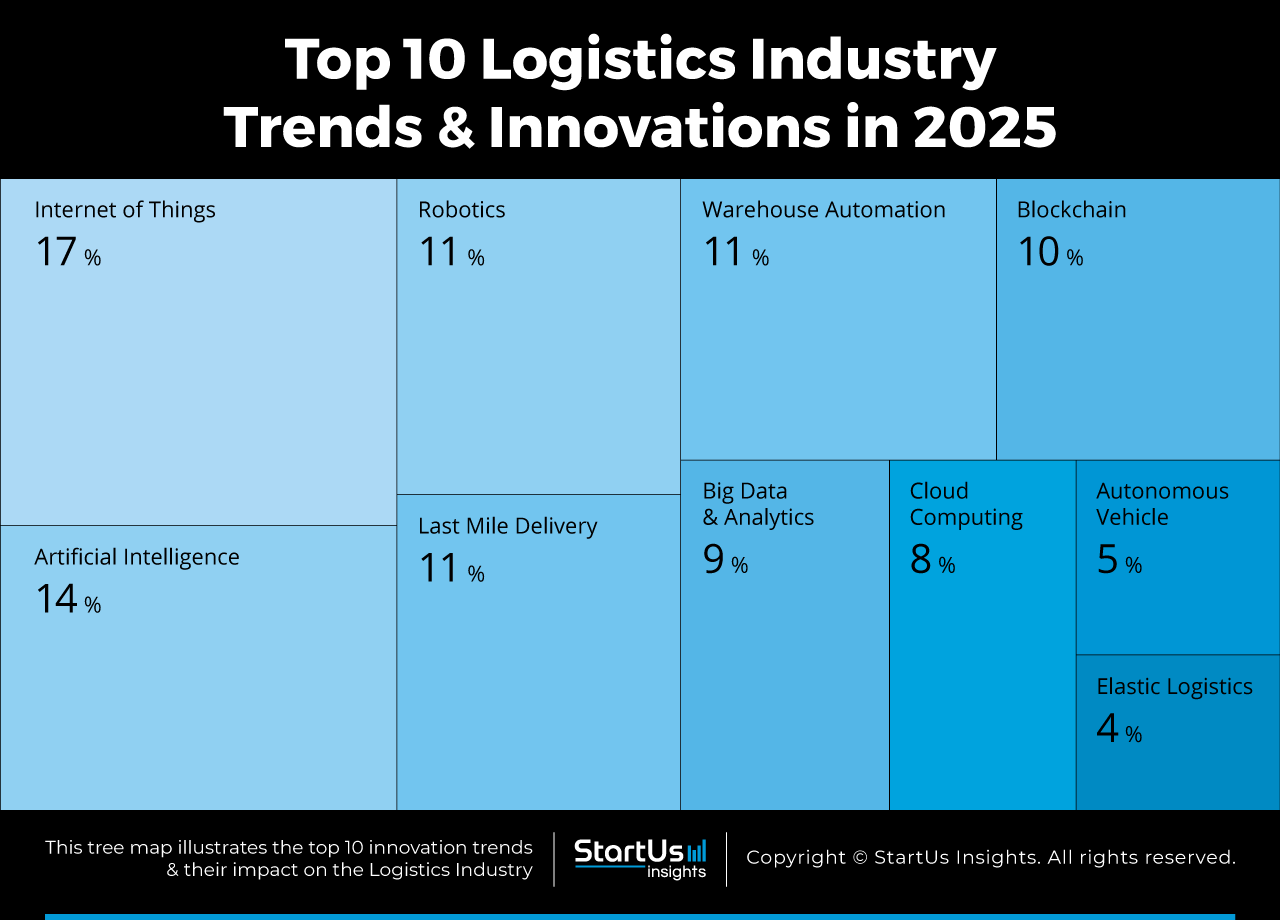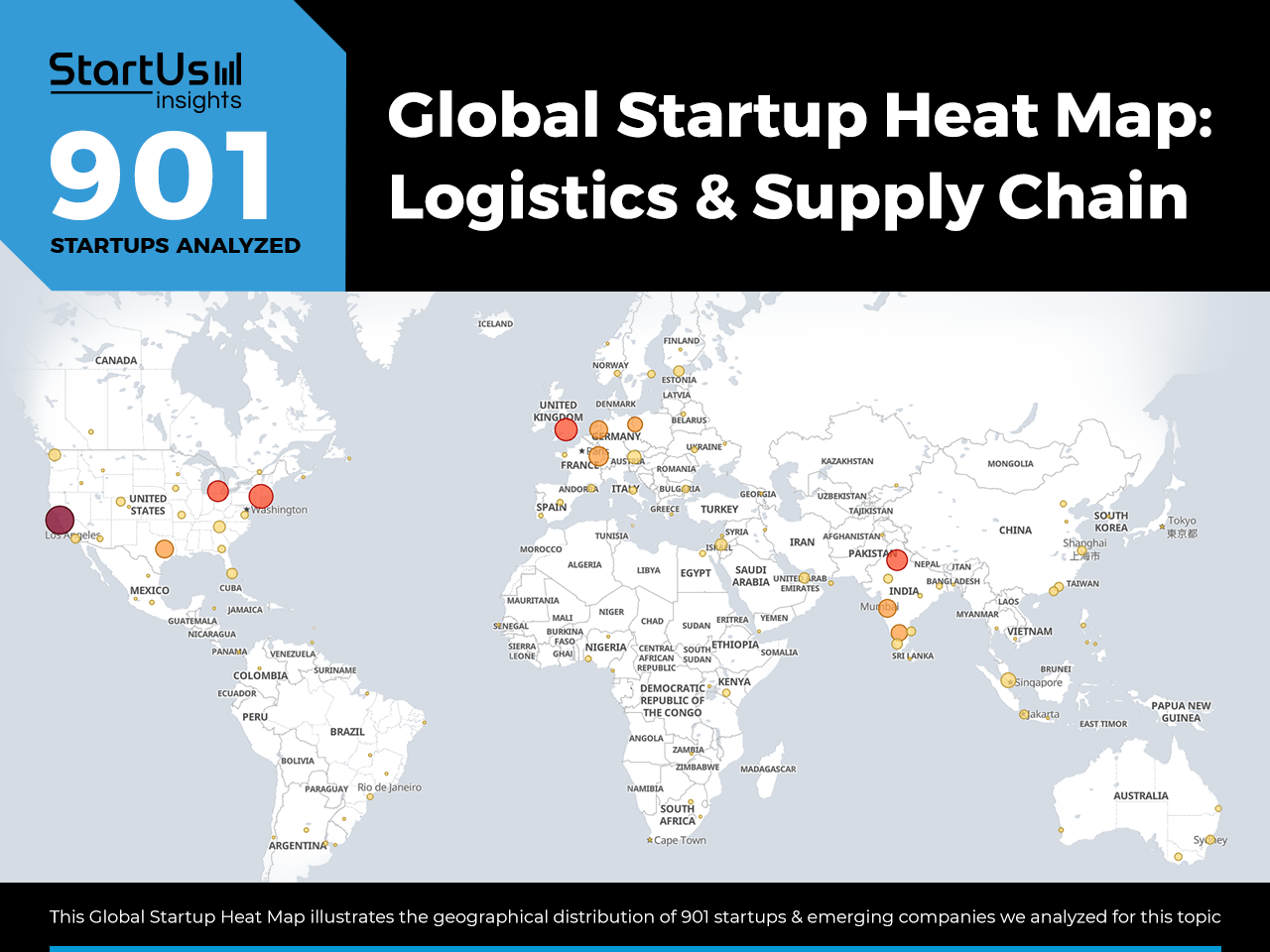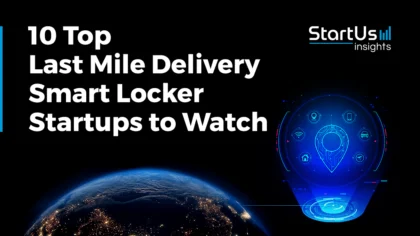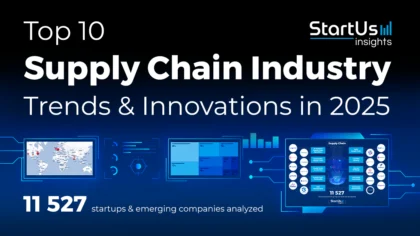Accelerate Productivity in 2025
Reignite Growth Despite the Global Slowdown
Logistics trends are shaped by significant advancements in technology solutions integrated into business processes. Next-generation logistics technology makes global supply chains more customer-centric and sustainable. Moreover, automation boosts productivity and workflow efficiency. Enhanced transparency and traceability in the supply chain provide flexible and dynamic relationships among stakeholders. Dive into this article to learn more about the top 10 logistics trends.
This article was last updated in July 2024.
What are the New Trends in Logistics?
- Internet of Things
- Artificial Intelligence
- Robotics
- Last Mile Delivery
- Warehouse Automation
- Blockchain
- Big Data and Analytics
- Cloud Computing
- Autonomous Vehicles (AVs)
- Elastic Logistics
Innovation Map outlines the Top 10 Current Trends in Logistics & 20 Promising Startups
For this in-depth research on the Top Global Logistics Trends & Startups, we analyzed a sample of 901 global startups & scaleups. This data-driven research provides innovation intelligence that helps you improve strategic decision-making by giving you an overview of emerging technologies in the logistics industry. In the Logistics Innovation Map, you get a comprehensive overview of the logistics industry trends & startups that impact your company.
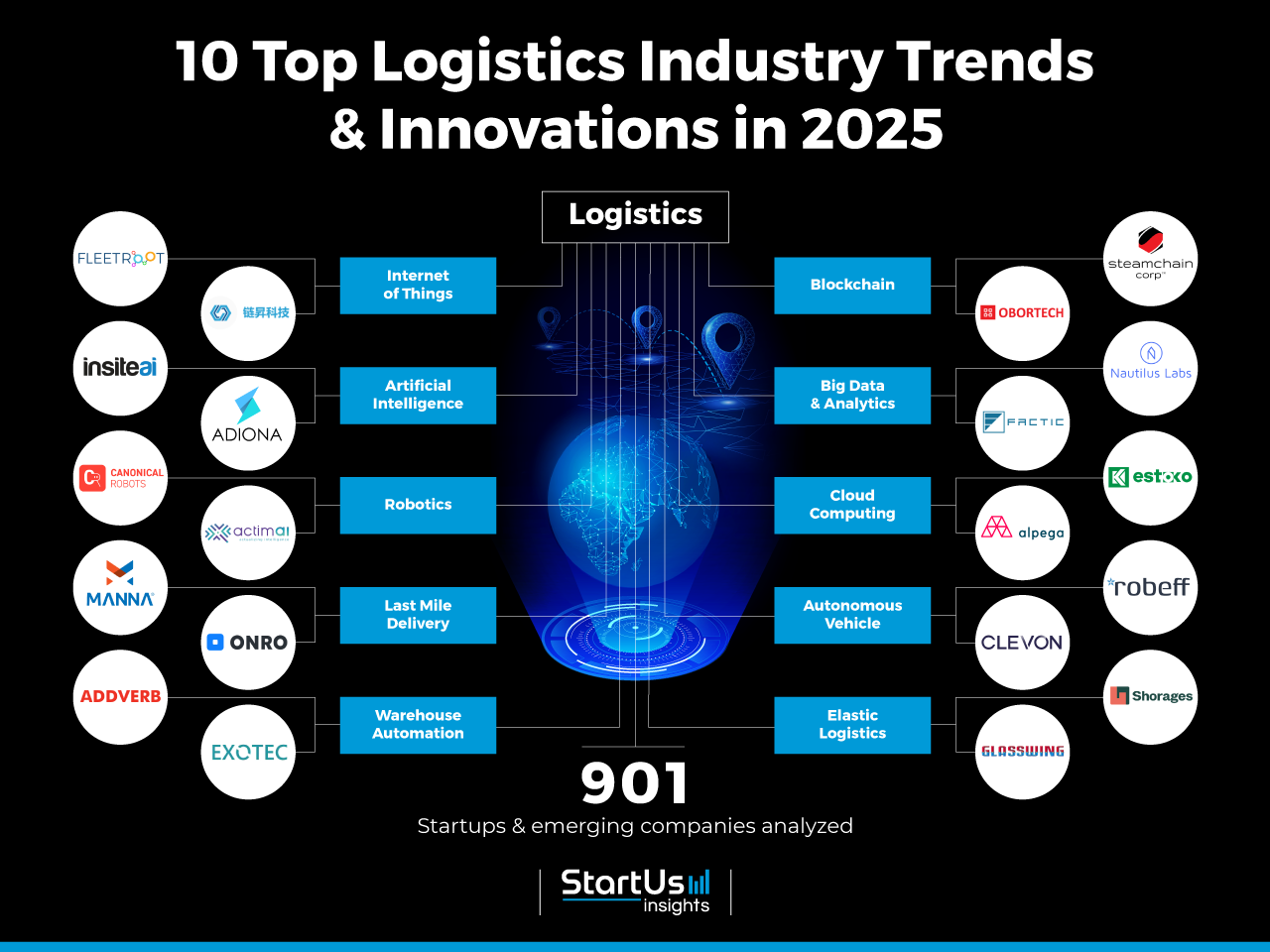
Want to explore all Logistics innovations & trends?
These insights are derived by working with our Big Data & Artificial Intelligence-powered StartUs Insights Discovery Platform, covering 4.7M+ startups & scaleups globally. As the world’s largest resource for data on emerging companies, the SaaS platform enables you to identify relevant technologies and industry trends quickly & exhaustively.
Tree Map reveals the Impact of the Top 10 Emerging Logistics Trends & Innovations in 2025
The Tree Map below illustrates the 10 emerging trends in logistics that will impact companies in 2025. The Internet of Things (IoT) enables real-time tracking and monitoring of goods and assets to enhance supply chain visibility and efficiency. AI powers predictive analytics, route optimization, and demand forecasting solutions, reducing costs and improving decision-making. Logistics companies are also integrating robotic systems and other automation systems to streamline fulfillment, warehousing operations, and last-mile deliveries.
Blockchain further enhances visibility, security, and traceability while big data and analytics offer real-time access to logistics operations. Such solutions reduce fraud, improve stakeholder trust, as well as optimize routes, inventory levels, and overall supply chain performance. Cloud computing plays a critical role in reducing IT costs for businesses while also delivering real-time operational data. Lastly, autonomous vehicles are automating last-mile deliveries and elastic logistics ensure resilient and flexible operations.
Global Startup Heat Map covers 901 Logistics Startups & Scaleups
The Global Startup Heat Map below highlights the global distribution of the 901 exemplary startups & scaleups that we analyzed for this research. Created through the StartUs Insights Discovery Platform, the Heat Map reveals that the United States is home to most of these companies while we also observe increased activity in India as well Europe, particularly in the UK.
Below, you get to meet 20 out of these 900+ promising startups & scaleups as well as the solutions they develop. These 20 startups were hand-picked based on criteria such as founding year, location, funding raised, and more. Depending on your specific needs, your top picks might look entirely different.
Top 10 Innovations and Trends in Logistics Industry (2025)
1. Internet of Things
IoT is a connection of physical devices that monitor and transfer data via the internet and without human intervention. IoT in logistics enhances visibility in every step of the supply chain and improves the efficiency of inventory management. Integrating IoT technology into logistics and supply chain operations improves efficiency, transparency, and real-time visibility of goods. For instance, it facilitates temperature and humidity monitoring for sensitive cargo, ensuring product quality and compliance with regulatory standards during transit.
IoT’s impact on the logistics industry extends further by enabling predictive analytics for logistics companies to anticipate demand fluctuations. Such solutions also optimize routing and scheduling as well as minimize environmental impacts through fuel consumption tracking. This contributes to sustainable and eco-friendly supply chain practices.
Fleetroot simplifies Logistics Fleet Management
UAE-based startup Fleetroot offers an IoT platform for companies to control and manage their fleet. Fleetroot offers fuel management solutions to fleet managers by providing fuel consumption and wastage reports. The platform helps monitor the performance of a vehicle and sends critical alerts to the system using sensors and devices embedded in the vehicle.
The data is then analyzed along with the historical data in order to predict and plan the maintenance of fleets. Fleetroot also offers route optimization and delivery solutions for the transportation of goods.
Anhui Liansheng Technology provides Logistics Operation as a Service (OaaS)
Anhui Liansheng Technology is a US-based startup that develops combines artificial intelligence of things (AIoT) and SaaS to offer OaaS for logistics companies. The startup’s solution allows small and medium businesses to quickly digitize operations and integrate AI, IoT, and robotics to improve warehouse and logistics efficiency.
The company further leverages trusted computing, digital twin simulations, and AI to drive decision-making. This allows logistics businesses to make operations management more data-driven while reducing overall operational costs.
2. Artificial Intelligence
AI and machine learning algorithms enable logistics companies to be proactive in dealing with demand fluctuations. For example, AI-based forecasting allows managers to plan supply chain processes and reduce inventory waste. Businesses are also leveraging AI to optimize route planning and load consolidation. This reduces fuel consumption and carbon emissions and enhances overall sustainability efforts. AI-driven chatbots and virtual assistants further improve customer service and streamline communication within the supply chain.
AI-powered robots and drones are used for tasks like inventory counting and last-mile delivery, improving efficiency and reducing labor costs. Furthermore, AI-driven risk assessment and fraud detection systems enhance security and compliance in logistics operations. This allows logistics companies to automate security tracking and safeguard shipments, reducing financial losses.
Insite offers Demand Forecasts
New Zealand-based startup Insite makes AI-based software solutions for price prediction, demand forecasting, and optimization of flows and processes. The startup primarily caters to the consumer packaged goods (CPG) and retail industries.
The software provides modules for risk assessment and demand forecasting to optimize process decisions and control operational conditions. Its machine learning further offers tools to collect and integrate process data in real-time. As a result, managers are able to make data-driven decisions on product replenishment.
Adiona aids in Process Optimization
Australian startup Adiona develops AI-based optimization software-as-a-service (OSaaS) that allows companies to improve their logistics processes and reduce costs. The startup’s software, FlexpOps API, optimizes static and dynamic delivery routes by solving vehicle routing and related challenges.
In addition, the software supports the decision-making of fleets over time by predicting conditions such as demand, weather, and traffic by employing machine learning techniques. It also optimizes the workforce requirement and automates redeployment.
3. Robotics
Integrating robotics into logistics increases the speed and accuracy of supply chain processes and reduces human error. Robots offer more uptime and increase productivity when compared to human workers. Robots, however, do not take up the jobs of humans but rather work collaboratively alongside them to increase efficiency.
Physical robots, such as collaborative robots (cobots) and autonomous mobile robots (AMRs), are used to pick up and transport goods in warehouses and storage facilities. Moreover, software robots perform repetitive and mundane tasks that free up time for human workers.
Canonical Robots builds Collaborative Robots for Logistics
Spanish startup Canonical Robots creates various collaborative robots to facilitate supply chain processes. Cobots work collaboratively with human workers, offer assistance, and enhance productivity in logistics operations. These robots pick, place, and pack goods in a brief span while eliminating potential human errors.
The startup’s cobots have 6 axle joints that facilitate a wide range of flexibility and movement that mimic the human arm. Additionally, these robots assist human workers in picking, placing, palletizing, and packaging operations.
Actimai advances Robotic Process Automation (RPA)
Philippino startup Actimai, designs, deploys, manages, and optimizes RPA solutions by leveraging AI and big data. The startup’s platform optimizes software robotic processes in order to deliver insights and analytics for process improvement.
RPA offers automation of low-level repetitive tasks, eliminates human error, and reduces overhead costs. For example, the startup’s platform performs operations like invoice processing, automatic storing of information in audit trails, and purchase order input automation.
4. Last Mile Delivery
Last-mile delivery is undergoing significant technological transformation in response to challenges like traffic congestion, customer preferences, and regulatory complexities. Alternative delivery methods, like autonomous robots and drones, ensure faster, more efficient deliveries. Similarly, micro-fulfillment centers strategically positioned in urban areas reduce transit times. Crowdsourced delivery platforms tap into local resources for flexible, on-demand service.
Same-day and instant delivery options also cater to consumer demand for speed. Further, smart lockers, data-driven routing, and sustainability initiatives enhance convenience, efficiency, and environmental responsibility. Customer experience improvements and collaborative logistics are at the forefront of addressing evolving customer expectations while optimizing efficiency.
Manna makes Delivery Drones
Irish startup Manna offers drone delivery as a service to restaurant chains with its aviation-grade fleet of delivery drones. Manna’s drones are capable of flying at an altitude of 80 meters with a speed of 80 km per hour.
Delivery of goods by drones resolves the problem of traffic congestion in the last mile. Drones have the capability to reach remote areas, thus reducing the delivery time and cost.
Onro makes Last-Mile Delivery Software
Onro is a Lithuanian startup that makes last-mile delivery software to empower businesses to efficiently manage orders, dispatch drivers, and track deliveries in real-time. It offers solutions for the delivery of grocery, retail items, pharmaceuticals, e-commerce products, beverages, and more.
The startup’s software thus allows businesses with on-demand, pickup, delivery, or courier services to mitigate in-house software development. This, in turn, allows them to mitigate expensive development costs and accelerate the time to market.
5. Warehouse Automation
Automated warehouse technologies include automated guided vehicles (AGVs), robotic picking systems, automated storage and retrieval systems (ASRS), and put-wall picking. They streamline operations within the warehouse and also have a ripple effect on the last-mile delivery phase. By reducing errors and increasing productivity, warehouse automation ensures that products are accurately picked, packed, and ready for transit.
The synchronization of these advanced automation solutions with last-mile logistics systems further ensures a seamless flow of goods. This enables faster and more precise deliveries. Ultimately, warehouse automation becomes an essential part of the larger logistics ecosystem. Such solutions optimize operational logistics costs and improve the delivery of last-mile deliveries.
Addverb Technologies offers Automated Guided Vehicles
AGV integration in the warehouse helps in the automation of moving goods. AGVs substitute human labor for addressing challenges regarding processing high-volume goods at scale. Indian startup Addverb Technologies works on Dynamo, an AGV for the transport of diverse loads in the warehouse.
Addverb offers a custom Dynamo AGV with different guidance systems including laser, inertial, wire, and magnetic tape. Also, Dynamo requires minimum to no human interference in the execution of picking operations in the warehouse.
Exotec provides an Automated Storage & Retrieval System
French startup Exotec builds the automated robot Skypod to optimize eCommerce warehouses. The Skypod system optimizes storage space by employing vertical storage methods in order to increase the height in warehouses by up to 10 meters.
ASRS assists in the management of product and material storage in automated warehouses that improve floor space utilization and do not require manual labor to operate. This reducing the overall operational cost and increasing safety.
6. Blockchain
Blockchain’s decentralized ledger system ensures the integrity and immutability of transaction records. This addresses the need for secure and tamper-proof documentation in the complex logistics supply chain, enhancing security, transparency, and efficiency. Through blockchain, stakeholders in logistics operations access real-time and accurate information on the movement and status of goods, providing complete visibility and traceability.
Smart contracts, a key feature of blockchain, automate and streamline various aspects of logistics, including customs clearance and payment processing. These self-executing contracts enable quicker approvals and reduce processing times at checkpoints, speeding up the entire supply chain. As blockchain continues to gain adoption, it improves trust among participants, reduces administrative burdens, and ensures the secure and efficient flow of goods worldwide.
Steamchain offers Smart Contracts for Logistics Operations
The US-based startup Steamchain offers a blockchain platform that simplifies payment processes using its World Trade Logistics (WTL) smart contract system. WTL smart contracts enable B2B payments and prevent fraud by providing an immutable record of all transactions.
WTL smart contracts enable businesses to minimize currency fluctuation costs, in addition to eliminating the costs of currency conversion.
OBORTECH ensures a Connected & Secure Supply Chain Ecosystem
OBORTECH is an Estonian startup that utilizes blockchain to build a connected and secure supply chain ecosystem. The startup’s blockchain and cloud-powered communication solution, Smart Hub, allows stakeholders to store and share information in a central platform. OBORTECH also integrates IoT sensors into trucks or containers to monitor key physical measurements and ensure product safety.
The tamper-proof solution functions as a trustable and decentralized networking marketplace. This, in turn, ensures open communication across supply chain operators and stakeholders. The increased transparency further increases supply chain efficiency and reduces waste.
7. Big Data & Analytics
Big data and analytics solutions leverage the power of data for informed decision-making and process optimization. Warehouse operations benefit from data-driven insights that enhance productivity by optimizing layout designs, inventory placement, and order-picking strategies. Logistics companies leverage big data to monitor real-time position and weather conditions. This enables them to make dynamic route adjustments and improve delivery planning, resulting in reduced transit times and fuel consumption.
Market data analysis supports strategic decision-making, allowing logistics providers to optimize supplier relationships. It also allows them to adjust pricing strategies and manage inventory levels more effectively. Further, the integration of big data and analytics enables the generation of comprehensive risk management reports as well as identifying anomalies and trends. This empowers businesses to proactively address potential disruptions and supply chain vulnerabilities.
Nautilus enhances Maritime Transport Performance Management
The US-based company Nautilus Labs offers AI solutions to help maritime companies reduce fuel consumption and increase their operational efficiency. Nautilus’ software analyzes the historical voyage data and predicts the optimal speed and fuel consumption. The cloud-based platform also generates the vessel performance data that later helps in optimizing the fuel costs.
FACTIC offers Prescriptive Analytics for Inventory Planning
The US-based startup FACTIC offers a SaaS platform that provides predictive analytics solutions for the food and beverage industries. FACTIC leverages data mining and AI techniques to analyze the data from internal and external sources to predict future sales.
The platform predicts deviation in demand and makes data-driven decisions to automate procurement. The platform also provides tools for the optimization of stock by employing auto-replenishment.
8. Cloud Computing
Cloud-based SaaS solutions are reshaping the logistics landscape by offering scalable and cost-effective solutions. Logistics companies are adopting cloud-based SaaS platforms to provide pay-per-use models, thereby reducing the need for significant capital investments in IT infrastructure. This cost-effective approach minimizes financial risks and allows businesses to allocate resources more efficiently. Cloud-based applications also streamline global logistics management by breaking down geographical barriers.
Cloud-based logistics solutions also tackle communication challenges by providing secure and accessible collaboration platforms. Teams across the supply chain easily exchange data and information, enhancing coordination and responsiveness by ensuring centralized communication. Further, cloud integration facilitates data collection from various management systems to analyze and optimize overall processes. This data-driven approach leads to better decision-making, improved efficiency, and enhanced customer service.
ESTOKO Logistics enables Cloud Logistics
ESTOKO Logistics is a Spanish startup that advances cloud logistics and offers warehousing as a service. The startup’s cloud platform allows businesses to centralize and secure logistics storage management. It provides dashboards and reports to better control stock operations. It also integrates with enterprise resource planning (ERP) systems.
The platform’s use of blockchain further ensures end-to-end data transparency, increasing stakeholder trust across the supply chain. These features together allow businesses to manage multiple warehouses and unify their billing while reducing transportation costs and improving service times to destinations.
Alpega develops a Cloud-based Transport Management System
Belgian startup Alpega creates a cloud-based SaaS Inet transportation management system for end-to-end transportation needs. The software solution enables communication in real-time between manufacturers and a broad network of logistics providers. The Inet TMS automates logistics processes and consolidates transport demands into a single system.
The software solution also provides the tracking of shipments through a mobile application. The cloud platform allows Alpega to release upgraded software to the customers on a quarterly basis, in contrast to on-premise software that follows a yearly upgrade cycle.
9. Autonomous Vehicles
Autonomous vehicles, an upcoming trend in logistics, enhance vehicle safety by eliminating the risk of human errors, such as driver fatigue and distraction. This ensures that goods are transported safely and reliably, thereby reducing the incidence of accidents and associated costs. They find use in both first and last-mile delivery operations. Autonomous delivery vehicles operate continuously and lead to increased efficiency in the supply chain. This translates to quicker and more flexible deliveries, especially in urban areas.
In addition to improving safety and efficiency, autonomous vehicles contribute to environmental sustainability. They enhance fuel efficiency by implementing platooning techniques on long-haul routes, reducing wind resistance and fuel consumption. Moreover, autonomous vehicles leverage AI-enhanced technology to optimize travel routes, avoiding traffic jams and selecting the most efficient paths to reduce fuel consumption and emissions.
Robeff Technology develops Autonomous Delivery Robots
Robeff Technology, a Turkish startup, develops autonomous robotic vehicles for food and retail deliveries. The vehicles include an advanced driver-assistance system (ADAS) and a driverless vehicle system, ensuring efficient and secure last-mile deliveries both indoors and outdoors. Robeff Technology’s products include the RBF-ESC200 electronic speed controller and the RBF-DBW40 single-phase bidirectional steer-by-wire and brake-by-wire control unit. Additionally, its torque sensor interface enhances efficiency and response times for safe autonomous control. These innovations reduce the cost of in-house delivery operations across various industries, including food and retail.
Clevon makes On-demand Autonomous Delivery Vehicles
US-based startup Clevon produces autonomous electric robot carriers for last-mile delivery. These vehicles navigate urban environments, delivering a wide range of goods, from groceries to home appliances. A single teleoperator manages multiple carriers to reduce operational costs. By offering a zero-emission delivery solution, Clevon assists companies in achieving their carbon emission targets while enhancing delivery methods.
10. Elastic Logistics
Elastic logistics allows businesses to efficiently manage their operations during periods of fluctuating demand. It allows businesses to quickly upscale or downscale supply chain operations in response to market demand. During peak seasons, companies are able to easily ramp up their production, transportation, and warehousing capacities to meet increased customer orders. Conversely, during slower periods, they scale down to avoid unnecessary costs associated with overcapacity.
This approach also prevents underutilization of vessels and transportation assets by adapting capacity to match demand, reducing costs and environmental impact. Elastic logistics mitigates constraints on warehousing and storage by dynamically adjusting space requirements. It also tackles the problem of overstocking as companies adjust their inventory levels to align with actual demand, reducing carrying costs and the risk of obsolescence.
Shorages provides On-Demand Warehousing
United Arab Emirates-based startup Shorages is a B2B on-demand warehousing marketplace serving small and medium enterprises (SMEs). Shorages aids companies in finding short-term warehousing requirements from a wide network.
On one hand, the platform allows owners to rent out unused space in their warehouses to meet short-term needs. On the other, they offer pay-per-use and on-demand storage and fulfillment services for their customers.
GlassWing offers On-Demand Delivery Vehicles
Indian startup GlassWing offers a wide range of commercial vehicles for on-demand freight transport. The GlassWing platform forms a logistics service network connecting the freight owners with transporters.
The startup also provides solutions such as real-time tracking, route optimization, freight security customized reporting, real-time alerts, and reduces freight costs by leveraging AI-enabled technology.
Discover all Future Logistics Technologies & Startups
With customer expectations continuously on the rise and as interests shift towards product variety and personalized services, the logistics and supply chain sectors face mounting pressures. Further, advancements in emerging technologies such as IoT, automated mobile robots, and AI and blockchain solutions result in companies struggling to choose the most suitable technologies to invest in. As technology progress continues, it is important for companies to be proactive and identify potentially disruptive changes at an early stage.
The Logistics Industry Trends & Startups outlined in this report only scratch the surface of trends that we identified during our in-depth research. Among others, hyperlocal solutions, drones, and sustainable technologies will transform the sector as we know it today. Identifying new opportunities and emerging technologies to implement into your business early on goes a long way in gaining a competitive advantage. Get in touch to easily and exhaustively scout relevant technologies & startups that matter to you.


 WATCH THE VIDEO VERSION
WATCH THE VIDEO VERSION 